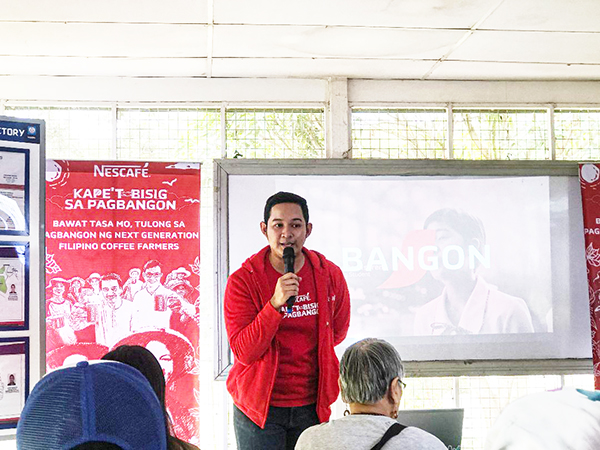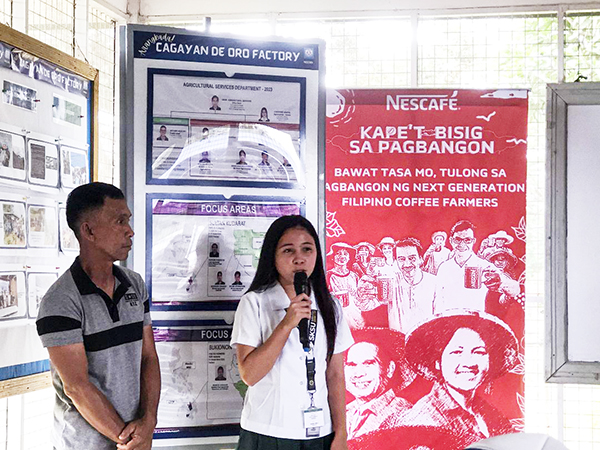MALAYBALAY CITY, Bukidnon – The coffee industry in Mindanao is facing challenges in producing a new generation of farmers as many youths are not inclined towards agriculture.

Nestlé Classic Assistant Brand Manager Igi Natunauan presents the upcoming ‘Kape’t Bisig sa Pagbangon’ campaign in October during its pre-launching at the Bukidnon Integrated Coffee Center of Nestlé at the Northern Mindanao Agricultural Crop and Livestock Research Complex in Malaybalay City, Bukidnon, on Thursday, September 21. (Franck Dick Rosete)
Donnel Tiedra, corporate affairs executive of Nestlé Philippines, said majority of young people are not interested in agriculture as they always associate this sector to poverty and hard labor, making these among the reasons for low coffee production in the country, aside from land conversion.
“Those young people, they need to be educated so that they will be the ones to manage their farms and in order to improve their coffee production,” Tiedra said in a press conference on Thursday, September 21, during the pre-launching of the “Kape’t Bisig sa Pagbangon” campaign in October, adding that farmers should apply good agricultural practices.
Nestlé, the biggest manufacturer of instant coffee that uses coffee beans from Filipino farmers, will launch the campaign to help them and mobilize people to raise awareness and talk about the current coffee landscape.
The event was held at the Bukidnon Integrated Coffee Center of Nestlé at the Northern Mindanao Agricultural Crop and Livestock Research Complex managed by the DA-10 here.
Tiedra said coffee sufficiency level in the country is only 27 percent, with an average yield of 400 to 500 kilos per hectare.
This is much lower than Vietnam, with an average yield, he said, of two tons per hectare.
Carlota Madriaga, regional technical director of the Department of Agriculture (DA)-Region 10, said five-year data on the annual performance of every coffee variety in the region from 2016 to 2020 echoed Tiedra’s remarks on low coffee production.
Aside from using online platform to raise awareness, the company, under the campaign, will also provide a P10-million educational grant to children of Filipino coffee farmers in three agricultural state universities in Mindanao – the Central Mindanao University, the Sultan Kudarat State University, and the University of Southern Mindanao.

BS Agricultural Technology student Quennie Subasco from the Sultan Kudarat State University and her father deliver a message during the pre-launching of the ‘Kape’t Bisig sa Pagbangon’ at the Bukidnon Integrated Coffee Center of Nestlé at the Northern Mindanao Agricultural Crop and Livestock Research Complex in Malaybalay City, Bukidnon, on Thursday, September 21. (Franck Dick Rosete)
These schools will help the company select the eligible junior and senior college students who will receive a one-time P25,000 financial grant that can be used for school requirements. The company hopes that the eligible students will be the next generation of coffee farmers.
Quennie Subasco, a BS Agricultural Technology student at Sultan Kudarat State University, echoed Tiedra’s statement on the stereotypes of working in the agriculture sector, saying that the youth thought that it was a dirty job, had no future, and would just end up being a farmer.
Despite this, Subasco, who is also the daughter of a coffee farmer, still pursues agriculture in college.
“I was convinced (to take) agriculture because we can really see the reducing number of students taking agriculture. I want to show them that there is a future in agriculture, many benefits, and awaiting opportunities,” she said.
An Cristie Tangcalagan of DA-10 echoed cliches and recalled the frustration she felt as a granddaughter of farmers from maternal and paternal sides when farmers’ land in Barangay Canitoan in this city was converted into a subdivision.
“Maybe you think that we are giving up agriculture, but no, we are still here, and we are fighting for it,” Tangcalagan, who joined the event, said.
Igi Natunauan, assistant brand manager of Nestlé Classic, urged the public to inspire the youth “that they can do something to improve the agricultural landscape of coffee in the Philippines.”